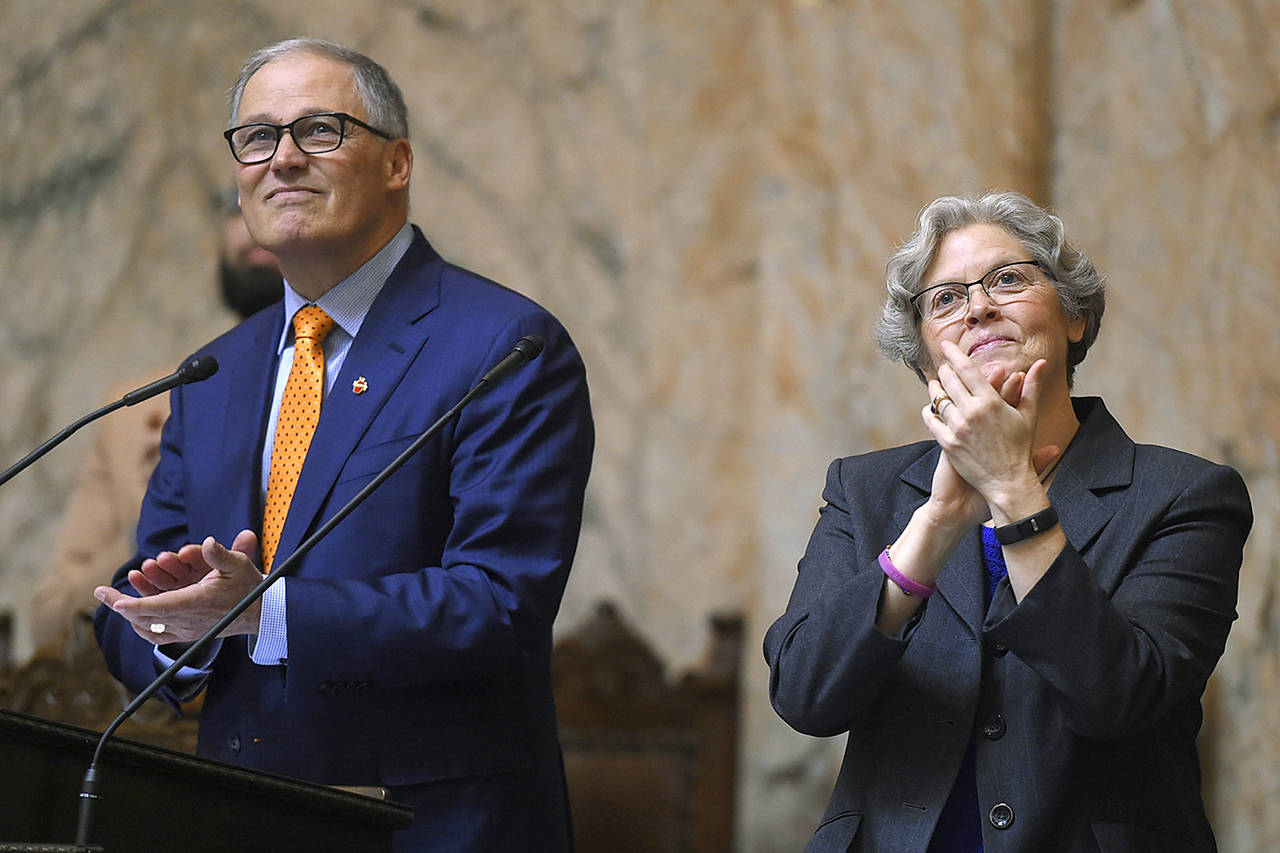OLYMPIA — Gov. Jay Inslee pressed lawmakers Tuesday to show greater resolve in reducing the number of unsheltered people and to advance the fight against climate change by passing a clean fuel standard.
Inslee focused on those priorities in his State of the State address, a reflection of their importance to him and the political limits for one’s agenda in a 60-day legislative session in an election year.
Neither is a new challenge but in both cases the state’s past efforts aren’t making progress fast enough, he said.
Inslee is proposing to siphon $319 million from emergency reserves for a state-driven effort to cut in half the number of people living outside in the next two years. His blueprint requires cities and counties to pitch in with a goal of adding shelter beds and supportive housing, and increasing the availability of rental and other housing assistance.
About 10,000 people in the state are without shelter, and more than 11,000 live in temporary homeless housing, according to the most recent annual report from the state Department of Commerce.
“Let’s bring Washingtonians in from the cold,” he said.
Inslee acknowledged his use of the Rainy Day Fund isn’t popular with lawmakers in either party.
“But I can’t imagine there is anyone here today who doesn’t believe we need to act — and act now — to help the most vulnerable in Washington,” he said. “I will gauge our success not on where the money comes from, but how many people we can move to safe housing.”
Inslee’s other focal point Tuesday was climate change, the defining issue of his two-term tenure.
In the 2019 session, Inslee teamed with the Democratic-controlled Legislature to enact several laws, including one requiring Washington utilities to transition to a carbon-neutral electricity supply by 2030 and to obtain 100% of their electricity from carbon-free sources by 2045.
“While we’ve made progress, we still haven’t addressed the nearly half of our emissions that comes from the transportation sector,” he said. “This is a huge hole in our mutual efforts.”
His answer — as it was in 2019 — is enacting a new clean fuel standard requiring gasoline be produced with less concentration of carbon molecules. California, Oregon and British Columbia are already implementing such standards.
“We need what the rest of the West Coast has already built: a clean fuel standard that calls upon the oil and gas industry to give Washington consumers cleaner fuels,” he said.
House Democrats passed a bill last year, but it died in the Senate where some Democrats and all Republicans expressed concern such a standard would push gas prices higher and not reduce emissions very much or very quickly.
Inslee seemed to take aim at opponents Tuesday.
Washington “is not a state of climate denial. It is a state of climate science acceptance,” he said. “For those who say we shouldn’t take action, I say climate inaction is just as deadly as climate denial.”
Sen. Steve Hobbs, D-Lake Stevens, chairman of the Senate Transportation Committee, opposed the bill and it died in his committee. He said Tuesday he knows climate change is real, but he said a clean fuel standard is the least effective way to reduce carbon emissions, based on findings of a nonpartisan analysis done in California.
Hobbs said he’s drawn up a plan to reduce emissions, as well as fund the removal of fish passage barriers and deal with the damaging effects of stormwater runoff. It raises the money by imposing a fee on carbon emissions — an idea Inslee has championed but voters have rejected — and hiking the gas tax. His transportation package proposal did not advance out of the committee last year.
Sen. John Braun, R-Centralia, criticized a clean fuel standard when he delivered the Republican response to Inslee’s address.
“Do the governor’s priorities match up with things that are important in your everyday life, or does it sound like he’s trying to make his priorities your priorities – instead of the other way around?” he said. “The changes he supports would dramatically drive up the cost we all pay at the pump. But unlike the gas tax, it wouldn’t do a thing to improve the quality or quantity of the roads across our state.”
Afterwards, Sen. Jesse Salomon, D-Shoreline, embraced the governor’s proposal and said “a lot” of Democratic caucus members want to find a way to make it happen this year.
“Climate change is hitting us hard. There was urgency in the past. There’s extreme urgency now,” he said. “There’s no time to wait.”
Jerry Cornfield: 360-352-8623; jcornfield@herald net.com. Twitter: @dospueblos.
Talk to us
> Give us your news tips.
> Send us a letter to the editor.
> More Herald contact information.

























